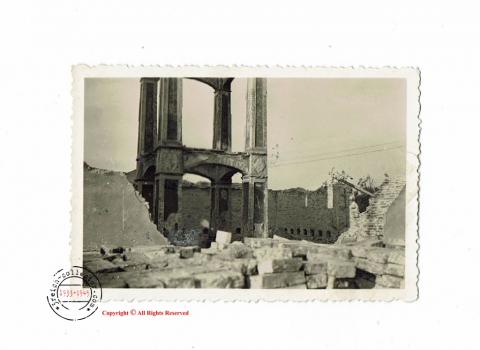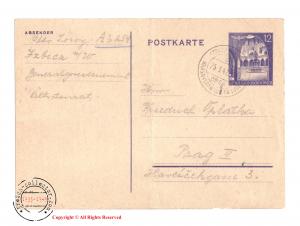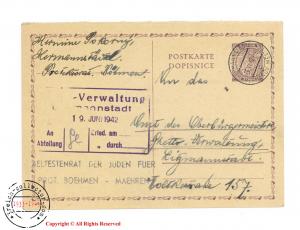Holocaust - WW2 Period Photo of Destroyed Mielec Synagogue
| Price: | $100.00 |
WW2 period and inedit private taken photo of the destroyed and pulled down Mielec Synagogue. We can see only some remains standing up.Mielec is a Polish city that before the war had a very big Jewish community and an important aircraft manufacturing factory. After the outbreak of World War II, the city and the airplane company fell into the hands of the German invaders. The period of German occupation lasted from 9 September 1939 to 6 August 1944 in Mielec. In the years of 19391944, the factory produced German bombers, and from 1943 also manufactured the fighter plane He297. The Nazis staffed much of the factory with slave labour. Initially, Jews from Mielec were enslaved in this forced labor camp. In 1942, the Jewish population of Mielec was deported to death camps, except for a few who remained as slave labour at the factory. Before the war, the Jewish population of Mielec was 2,800 out of a total population of 5,500. During the deportation, the factory hangars were the site of a mass murder of several hundred of Mielec's Jews, who were buried there. Subsequently, the factory used slave labour composed of Jews from other regions, prisoners of war, political prisoners, etc. The Gestapo used Jewish informants, the so-called V-leute in region to penetrate underground resistance and denounce hiding Jews;special barracks were set up in labour camp near Mielec for Jewish informers and their families, who were granted special privileges. These informants operated between 1942 and 1943 when they were finally executed by Gestapo themselves. After the war, a monument was placed at the factory with a vague inscription typical of holocaust memorials during the Communist era: "To those employees of the Factory and the inhabitants from the area of both Polish and Jewish nationality murdered during World War II: A tribute from Mielec's Youth." Another mass grave of Jews with a monument may be found in one corner of the Mielec Catholic cemetery, where the victims of a 1941 Nazi atrocity were buried. During the German occupation, all of Mielec's Jewish institutions and the Jewish cemetery were destroyed, and also many of the Jewish homes. During the German occupation, the Polish underground resistance movement had important centers in the former house of photographer August Jaderny and in the house of the Dębicki family. On March 29, 1943, a Polish underground partisan unit Jędrusie and the Home Army successfully carried out a daring attack on a German prison and liberated about 180 prisoners








